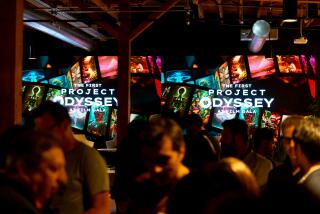Review: At REDCAT, ‘Tesseract’ blurs dance boundaries
“Tesseract” is a video, it’s a dance, but most of all it’s a 21st century techno-psychedelic trip, a dream state brought to life by pioneer dance filmmaker Charles Atlas and New York-based dancers-choreographers Rashaun Mitchell and Silas Riener.
Presented at REDCAT in a four-day run ending Sunday, “Tesseract” takes viewers on a science-fiction journey into geometry made human.
To get the definition out of the way: A tesseract is a cube within a cube, also called a cube prism. The creators of “Tesseract” use cubes and four-sided planes for a jumping-off point, and lines and hard-edged shapes keep cropping up in the choreography and flying through the scenic iconography of Atlas’ otherworldly 3D video.
But Atlas, Mitchell and Riener have a surfeit of creative and avant-garde ambitions for their two-act piece, which premiered earlier this year. Atlas worked for decades with Merce Cunningham and was the resident filmmaker for Cunningham’s company beginning in the early 1970s. Mitchell and Riener were distinguished Cunningham dancers during the troupe’s last years.
This piece represents a next step of the quest to push dancing’s limits. All three care about inventing new forms and new ways of moving — and new ways of seeing that movement. They marry video and live performance, manipulating audience members’ viewpoint and turning our frame of reference upside down, at one point literally. The work’s devotion to eye-popping invention has a downside, though, as “Tesseract” does slide into cerebral overload.
The piece begins with the feverish, 45-minute “Tesseract” 3D dance video, which Atlas directed and edited. Its six chapters of “science fiction” (Atlas’ description) have no story and flow one into the next, with composer Christian Fennesz’s white-noise electronic music for accompaniment.
The audience dons 3-D glasses to watch how the creators have played with depth perception in a video of dancers in black and white costumes (Mitchell and Riener’s designs) and hanging banners (by Fraser Taylor). Our vantage continually shifts, in and around the dancers. Even the aperture through which we watch the action gets bigger or smaller.
Later, dancers Hiroki Ichinose and Cori Kresge entice in a luxurious, hypnotic duet in a foggy landscape. The muscles in Kresge’s back seem to undulate mere inches from our eyes, thanks to the 3-D. In another scene, dancers encased in geometric forms perform above a Martian-like planet that has a white space station on the horizon.
Mitchell and Riener’s faces fill up the screen and they earnestly speak to us in gibberish, which is followed by a sensuous, yet similarly mysterious duet.
SIGN UP for the free Essential Arts & Culture newsletter »
We remove the glasses for the second act. Cameraman Ryan Thomas Jenkins stalks among six live dancers, filming them, and Atlas manipulates the pictures before projecting them onto a scrim. And there’s the rub: REDCAT was perhaps too small a venue for this portion of “Tesseract”; where you were sitting determined whether you saw the full double-exposure dancing effect. And I, unfortunately, did not.
Nevertheless, Mitchell and Riener’s choreography has an innate rhythm that was pleasing to watch in its naked form. And they have an accomplished and committed group of live performers, including David Rafael Botana, Eleanor Hullihan and Kate Jewett.
This was a trip I was glad to have taken.
♦ ♦ ♦ ♦ ♦ ♦ ♦ ♦ ♦ ♦
‘Tesseract’
Where: REDCAT, 631 W. 2nd St., L.A.
When: 8:30 p.m. Saturday, 3 p.m. Sunday
Tickets: $15-$25
Info: (213) 237-2800, www.redcat.org
See all of our latest arts news and reviews at latimes.com/arts.
ALSO
Syncopated Ladies dance their way into the boys club of tap
Alexa, meet Lauren: The smart home becomes performance art
More to Read
The biggest entertainment stories
Get our big stories about Hollywood, film, television, music, arts, culture and more right in your inbox as soon as they publish.
You may occasionally receive promotional content from the Los Angeles Times.










